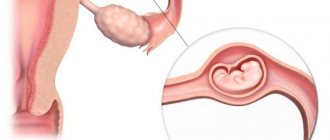How stress affects the menstrual cycle
The hypothalamic-pituitary system is responsible for the production of female hormones in the body. Severe stress can affect the functioning of the cerebral cortex and, accordingly, the production of hormones, as a result of which the menstrual cycle may be disrupted due to nervousness and a delay in menstruation may occur.
Nervous disorders cause menstrual irregularities of varying degrees. It depends on how much emotional stress the woman has experienced.
The delay period is 5 days or can be up to a month or even a year (in this case they speak of the onset of amenorrhea - the absence of menstruation).
Problems with cycle failure cause lack of sleep, troubles at work, in the family, such stress affects menstruation. But among the possible reasons for the delay there may be other factors:
- situations associated with strong positive emotions (for example, a wedding, moving to a new home);
- heavy physical activity, including in the gym;
- long-term adherence to a strict diet in order to lose weight;
- change in climatic conditions (this includes a trip to the sea).
Emotional stress, as well as severe shocks to the body in the form of lack of sleep, overwork or physical activity affect the amount of female hormones in the blood. And the consequences of such exposure are a delay in menstruation and an irregular cycle.
Why can periods disappear due to nervousness?
Emotional shock has a direct effect on the production of sex hormones.
Under the influence of stress, adrenaline and norepinephrine are released into the blood. With an increased concentration of these substances, a person experiences anger, aggression, hyperactivity, and excessive performance. A disruption in the cycle can occur not only under the influence of negative emotions. Excessive joy caused by a wedding or the birth of children, a trip to the sea, or a long-awaited meeting with a loved one similarly changes hormonal levels and can provoke a delay.
Other factors that can affect the regularity of your cycle:
- heavy physical activity - work at heights, high-intensity training, excessive work activity;
- a strict diet that disrupts metabolism;
- acclimatization when changing climatic zones;
- previous injuries and surgeries.
Perhaps nothing takes women by surprise more than a missed period. After all, if “these days” are delayed, it means that for some reason there was a disruption in the menstrual cycle.
Every woman of reproductive age has encountered such a problem at least once in her life. And the first thing that comes to the mind of a woman living a normal sex life is pregnancy.
Of course, a missed period is one of the first signs of pregnancy. but pregnancy is far from the only reason.
There are at least 9 more main and common reasons, which we will consider below in the article.
If the test shows two lines, then everything is clear, but if the pregnancy test is negative and you still don’t get your period, then you should seriously think about what is the reason for the delay. But the only correct decision will still be examination by a gynecologist and further treatment of the cause of menstrual irregularities.
It’s not for nothing that they say that all diseases are caused by nerves. Any stress greatly affects many processes in our body.
including even a woman's menstrual cycle. The fact is that during stress, the body reduces the quantitative production of luteinizing hormone (LH), which in turn affects ovulation.
Try to always find only good things in life.
Delayed menstruation causes the hearts of many girls and women to beat faster than normal. For some, this is associated with the long-awaited joys of upcoming motherhood, while others are overcome by complete confusion and panic.
Of course, the problem of delaying your period can be caused not only by pregnancy. And this, unfortunately, often provokes in some women an irresponsible attitude towards their health problems, which is fraught with serious consequences.
A delay in menstruation can be the result of physiological changes in the body, as well as be a manifestation of functional failures or diseases of both the genital and other organs (“extragenital pathology”).
Normally, menstruation does not occur during pregnancy. After childbirth, the mother’s cycle is also not restored immediately; this largely depends on whether the woman is lactating.
In women without pregnancy, an increase in cycle length may be a manifestation of perimenopause (menopause). Irregularity of the cycle in girls after the start of menstruation is also considered normal, if it is not accompanied by other disorders.
Functional disorders that can provoke disruption of the menstrual cycle are stress, intense physical activity, rapid weight loss, previous infection or other acute disease, climate change.
Maximum allowed delay
The duration of the delay in menstruation depends on the amount of stress and the individual characteristics of the woman. Most often, the menstrual cycle increases to 32 days (with a standard cycle length of 28 days), which corresponds to a delay of 4–5 days.
However, this does not always happen, and the absence of periods after stress can last up to a month. During the war, women lost their periods for years, which indicated the onset of amenorrhea.
How long a delay in menstruation lasts under stress also depends on a woman’s ability to withstand stress, on how quickly she manages to restore her usual balanced and calm state. If you are unable to cope with stress, it can develop into depression, and the delay will be prolonged or the cycle will become irregular.
Such problems, as a rule, do not occur in those women who know how to independently provide themselves with the necessary help or visit a psychologist, and also engage in strengthening the nervous system.
How many days of delay are considered normal?
The duration of the delay directly depends on the magnitude and regularity of the emotional shock. Usually there are no periods for about 5 days, then the discharge comes on its own, without drug therapy. This period may be increased or decreased. In rare cases, periods shift by 30 calendar days, that is, the duration of one cycle is 56-64 days.
The delay period depends on the individual characteristics of the body and its ability to withstand emotional overload. Usually a woman needs a couple of days of rest to put her nervous and hormonal system in order. There are often cases when it is not possible to cope with the problem on your own. In such a situation, the help of a psychologist is necessary, otherwise depression may begin due to nervousness, which will lead to amenorrhea - the complete loss of menstruation.
Calming the nervous system
The absence of menstruation due to stress is not a pathology; you can cope with it yourself. Here's what to do in such a situation:
- Take a break for yourself. There are many options here - to suit any opportunity and budget (a weekend trip to the mountains, time off from work, shopping, a delicious dessert, a warm bath).
- Add more positive emotions to your life: arrange a meeting with friends, a romantic date with your loved one, or invite your parents to dinner.
- Ensure quality sleep of at least 8 hours a day. Sometimes, to restore the cycle, it’s enough just to get some sleep; you can devote the next weekend to this.
- Monitor your nutritional intake. It should be balanced, contain a lot of vegetables and fruits, as well as the required amount of protein. Strict diets and strong restrictions are not allowed.
- Visit a psychologist who will help you cope with stress as quickly as possible.
- Learn to meditate and start doing yoga regularly. These ancient practices help keep your emotional state in balance.
- Find a hobby you like. It is very useful to have an outlet, something that will charge you with energy and restore peace of mind. For those who like to be alone with themselves, reading books, cooking, any handicrafts (macrame weaving, embroidery, knitting, sewing) are suitable, for those who prefer an active pastime - dancing, group aerobics training, skiing, skating rink, go-karting.
When your periods have disappeared due to stress, it is useful to take a course of vitamin preparations to generally strengthen the body (Supradin, Complivit) and the nervous system (Magne B6, Berocca). You can turn to traditional medicine. Infusions of soothing herbs will come to the rescue:
Herbs can be purchased at the pharmacy either individually or as part of sedative mixtures.
Here are some useful recipes:
- Pour 1 tbsp. l. valerian rhizomes into a saucepan, pour a glass of cold water, bring to a boil, reduce heat and boil for 30 minutes. Cool the resulting broth, strain and take 1 tbsp. l. three times a day for 10 days.
- Pour one spoon of St. John's wort herb into 300 ml of boiling water, leave for 2 hours and take 30 minutes before dinner.
Medicinal herbs can also be used for bathing. You need to brew 50–100 g of herbs with 1 liter of boiling water and leave for an hour or more, strain the resulting product and pour it into a warm bath (37 degrees).
The water procedure lasts about 20 minutes; it is most beneficial to do it before bed. The duration of the course is 10 days.
Folk remedies for cycle restoration
Herbal infusions are very often used in folk medicine. They effectively fight various diseases, and can also be used to treat stress and eliminate missed periods. Plants contain a large amount of vitamins and microelements that effectively cope with nervous disorders.
If the delay was caused by stress, then the most effective recipes are:
- parsley tincture. You need to take 2 tbsp. spoons of the plant, finely chop it and pour 1⁄2 liters of hot water. Next, the product is cooked over moderate heat for about 10 minutes. Afterwards you need to let it brew and cool for 30 minutes. You should start drinking the decoction a week before the expected date of menstruation. You need to consume 2 times a day, 120 ml;
- dandelion root tincture. You need to chop 1 teaspoon of the plant and pour 250 ml of hot water. Then put on low heat and cook for 15 minutes. Afterwards, the decoction should be infused for 2 hours. It is recommended to use the product twice a day, 120 ml. As a rule, the course of treatment lasts about 30 days.
After this, the menstrual cycle should return to normal and have the same duration as before.
- burdock root - 1 tbsp. infusion before meals three times a day will restore the balance of hormones in the body, the course will last for several months;
- Dandelion root will help not only with a delay in the menstrual cycle due to stress, but also with painful and heavy periods - 0.5 tbsp. The decoction should be taken in the morning and evening; to prepare the product, pour 1 tsp of boiling water. finely chopped roots and keep on low heat for about five minutes, before using, let it brew for two hours;
- leaves, roots and seeds of parsley - chop 2 tbsp. parsley root or seeds, pour two glasses of boiling water, keep on low heat for 10 minutes and leave for 30 minutes; course - a week before the expected date, 0.5 tbsp. in the morning and in the evening.
If menstruation is delayed due to stress, foot baths twice a day are good. Sea salt and mustard must be added to water at a temperature of 45°C; the procedure takes no more than 15 minutes.
How long can a period be delayed under stress? As a rule, it lasts from a week to a month. Sometimes there may be a disturbance lasting several months.
The following phenomena can cause a delay in discharge:
- Periodic psycho-emotional overload. These include regular conflicts at work, problems in the family or personal life, inadequate sleep, and others. If the emotional stress is complemented by severe physical overload, then menstruation is most likely to be delayed.
- Severe emotional shock. It can include some tragic event in which a woman participated or was a witness. It can suddenly and for a long period of time disable the nervous system.
https://www.youtube.com/watch?v=07T9-8NoJuw
It is worth knowing that when a woman whose body has been affected by stress is also very worried about a missed period, this disorder may worsen. Therefore, under no circumstances should you panic. Stress and missed periods are not a death sentence. It is simply necessary to take measures to eliminate them.
In what cases should you consult a doctor?
If your period is delayed due to stress for more than a month, you should contact a specialist who will help you restore your periods. The gynecologist will prescribe the necessary tests, and if it is confirmed that the cause of the disorder was emotional shock, he will prescribe sedatives (Tenoten, Novo-Passit, Afobazol, Persen).
In cases where such treatment does not help, and stress develops into depression, you cannot do without the help of a psychotherapist. A doctor may prescribe antidepressants, but only after consultation. Self-administration of such drugs is dangerous.
Every woman needs to learn to find a balance between work and rest. Self-care and love will not allow stress to creep up close, which means your menstrual cycle will be regular and your mood will always be wonderful.
Every woman knows that the menstrual cycle, which is characterized by its regularity, is evidence of health, while a delay may indicate not only pregnancy, but also the development of some pathology. In modern conditions, many women are faced with the phenomenon of delay due to stress - how dangerous it is, how long it can last, and what to do in such a situation - all this should be discussed in detail.
Drug therapy
Could there be a delay due to stress? From the above it is clear that yes. But how to return the monthly cycle, and for the delay to disappear, what medications should you take for this?
As a rule, the doctor prescribes herbal medicines to patients. They are aimed at restoring a normal mental state. The following medications are considered the most effective:
- Persen;
- Tenoten;
- Afobazole;
- Novo-grazing.
Lack of menstruation - the most common reasons
A woman's menstruation can be delayed or absent for a number of different reasons, from natural to pathological. The first group includes:
- Age - if the girl has not reached the age of seventeen, or we are talking about a lady who has experienced menopause, then the absence of menstruation is not considered a pathology.
- Pregnancy – not a single woman who is sexually active is immune from conception, since none of the modern means of contraception guarantees 100% effectiveness.
- Lactation - during breastfeeding, a number of hormonal changes occur in a woman’s body, which prevents the restoration of the menstrual cycle. Menstruation usually returns 4 to 8 weeks after the baby is weaned. But if, 12 months after birth, menstruation has not resumed, a consultation with a gynecologist will be required, even if breastfeeding continues.
In the second case, we will talk about reasons such as:
- inflammatory processes;
- pathologies of the uterus and/or ovaries;
- brain injury or tumor;
- genetic predisposition;
- Eating disorders – regular overeating, as well as prolonged fasting (including strict diets), can lead to menstrual irregularities.
Many women wonder whether stress can cause their periods to be delayed. Experts answer this question unequivocally in the affirmative. After all, the menstrual cycle depends not only on the functioning of the woman’s genitourinary system, but also on the proper functioning of the parts of the brain responsible for the production of hormones, which can be suspended due to stressful situations. As a result, you may encounter a phenomenon such as a delay in menstruation after stress.
In any case, identifying the cause of the cycle disorder on your own is potentially problematic, which means it is impossible to develop a treatment strategy. If your period is delayed for 7 days or more, and the pregnancy test shows a negative result (it is better to take two tests from different companies), then you should consult a gynecologist.
Delay due to stress – provoking factors and duration
Delay due to stress
A delay in menstruation after stress is familiar to many women today. How long a period can be delayed, in this case, directly depends on the intensity of emotional stress and individual sensitivity to their effects. The phenomenon of delay after stress can be provoked either by a long series of negative events or by a short but intense nervous shock or mental trauma.
What to do if your period is late due to stress
Combating delays due to stress
Even if a woman is completely sure that she has a delay after stress, she should not self-diagnose. Pregnancy and the development of diseases can only be ruled out through a comprehensive examination, which may include:
- laboratory studies of biological material (blood, urine);
- X-ray examination of the skull;
- ultrasound examination of the pelvic organs;
- laboratory blood test for hormones.
If the doctor determines that your period is delayed due to stress, he will develop a treatment strategy.
Is it possible to induce menstruation if there is a delay?
A delay in menstruation causes anxiety among the fair sex, no matter how long it lasts. It can be explained by certain factors.
If there is no menstruation without pregnancy, then they are caused in the following ways:
- Use of herbs. Herbs are used that improve the movement of bile and blood in the body, which have a beneficial effect on peristalsis and kidney function. Must have diuretic properties.
- Essential and vegetable oils. The components of the oils have a beneficial effect on the organs of the reproductive system, restoring their normal functioning.
- Medicines. When menstruation is delayed, gynecologists prescribe hormonal medications that cause them to appear. The artificial hormones included in the composition restore hormonal levels.
How to induce menstruation if you are late at home
No matter how long your period is delayed, you can induce it yourself at home. To do this, it is important to understand that absence occurs without pregnancy, otherwise a miscarriage may be caused.
- Infusion of bay leaf. Take 10 g of leaf, pour 400 ml of water. Boil over low heat for 5 minutes, pour into a container, leave for 3 hours. Drink the decoction chilled, 1 tbsp. l. 3-4 times a day. An infusion of bay leaf promotes uterine contractions, menstruation begins a short period of time after consumption.
- Chamomile tea. To prepare, take 2 bags of chamomile and pour 200 ml of boiling water. Leave for several hours, cool. Drink half a glass 2 times a day. Chamomile is a natural estrogen substitute. When consumed, their level increases significantly. Menstruation may begin prematurely. To prepare, take 2 bags of chamomile and pour 200 ml of boiling water. Leave for several hours, cool
- A decoction of elecampane. Pour 200 ml boiling water 1 tsp. herbs, boil for 15 minutes, then leave for 4 hours. Use 1 tsp. 2 times a day. Note! A decoction of elecampane is very dangerous for the female body; in case of an overdose, it causes heavy bleeding. Women suffering from heart disease should not consume elecampane.
- Hot bath. Hot water causes the body to overheat. As a result, blood vessels dilate and blood pressure decreases. Menstruation may begin almost immediately after the bath.
- Sex. Sexual arousal leads to a rush of blood to the pelvic organs. During orgasm, the uterus contracts, causing menstruation.
Prevention and treatment of delayed menstruation due to stress
Prevention and treatment of delayed menstruation
To restore a regular menstrual cycle and prevent repeated delays in periods due to stress later, you can use the recommendations below. Delayed menstruation due to stress, what to do:
- If possible, eliminate or minimize stressful situations.
- Adjust your physical activity, pay attention to your diet and regimen - it should be regular and balanced.
- Sleep schedule is no less important. It is widely believed that an adult needs about 8 hours to get a full night's rest. Currently, experts say that you can improve the quality of sleep if you organize its duration in multiples of 1.5 hours - this is due to the characteristics of the sleep phases.
- Choose an exciting hobby for yourself. Often, severe stress results from a monotonous and stressful life, which is completely devoted to work or household chores. If you sometimes do something truly interesting and enjoyable, it will help to “reboot” the nervous system, relieve tension, and, as a result, cope with such a phenomenon as a delay in menstruation after stress. You can choose drawing or fitness, dancing or even fishing.
- Visit a psychologist.
- It is recommended to take immunomodulators, sedatives and/or vitamins to minimize the effect of stress on the body.
- Many women are helped by traditional medicine and herbal medicine - in any case, consultation with a doctor before use is mandatory.
The most popular means are:
- carrot and parsley juice combined with celery juice;
- tea or decoction of rue - helps reduce blood pressure and heart rate, has a general tonic and strengthening effect;
- alcohol extract or lemon balm/valerian tea – reduces the sensitivity of the nervous system to external stimuli;
- aromatic oils of lavender or anise - you can simply inhale the smell by moistening a cotton pad (scarf) with oil, evaporate them in an aroma lamp, or use them to massage the temporal area.
If the above remedies are ineffective, your doctor may prescribe hormone therapy.
Stress is a period of adaptation of the body to new conditions. Human resources are mobilized, protective systems are activated, and the levels of adrenaline, testosterone and cortisol increase.
The stronger the experience, the stronger the hormonal imbalance. Therefore, delays in menstruation due to stress often happen.
Preventive measures
First of all, a woman needs to take care of her health. It is the female body that is most susceptible to stressful situations, since susceptibility is more sensitive to external factors. Of course, it is best to avoid stress. However, in the modern world this is quite difficult to achieve. Therefore, it is necessary to prevent stress and learn to react less to external stimuli.
It is also very important to maintain immunity during seasonal colds. After all, a weakened immune system will not be able to fight negative factors. It is important to maintain a healthy lifestyle, eating only healthy foods. It is recommended to write down a daily routine to prevent stressful situations. Try to take short breaks while working.
It is extremely important to get full rest on weekends so that the body relaxes and recovers after a difficult week of work. It is best to travel outside the city or walk through the forest. Nature helps relieve nervous tension, and thereby restores the emotional background.
Experts advise joining a gym or swimming pool, as physical activity has a positive effect on both mental and physical well-being. It is best to train 3 times a week. In order to prevent stress, you can find a new activity for yourself, for example, learn to draw, embroider, knit. Creativity allows the psyche to relax.
As soon as the development of mental illness stops, the menstrual cycle normalizes and the functioning of the whole body improves.
How does stress affect your periods?
Stress is a generalized name for all situations, external factors and conditions that go beyond a person’s usual comfort zone. These changes can be both unpleasant and pleasant:
- lack of sleep;
- emotional overload;
- anxiety about an upcoming wedding, performance, exam, moving;
- conflicts at work, with friends, in family;
- strict diets, fasting;
- physical or intellectual exhaustion, overwork;
- climate change.
Stress causes emotional and psychophysiological tension. The activity of the hypothalamus and pituitary gland, the parts of the brain that are responsible for the production of female hormones, changes. The severity of stress depends solely on the woman’s perception, her stability and sensitivity.
Menstruation and stress are directly related: the stronger and longer the emotional shock, the longer the cycle is delayed. A single shock causes a delay of 2-5 days, chronic stress can cause amenorrhea, which lasts for years.
The answer to the question why menstruation is delayed under stress is that a woman finds herself in a situation that she cannot cope with in the usual ways, because of the search for a solution, tension and anxiety arise, the body responds to danger by increasing the level of hormones that awaken strength and aggression , endurance. The goal of the organism is to survive. The function of childbearing fades into the background, the level of female hormones drops.
How long can a period be delayed after stress?
The duration of the failure depends on the level of tension, mental and physiological characteristics of the woman. On average, menstruation occurs 4-5 days later, that is, if the cycle is 28 days, it will turn into 32 days. This delay is considered acceptable.
Lack of regulation for a month or longer is a cause for concern.
Women wonder if they can get their periods earlier than usual. That happens. It is impossible to predict the specific consequences of hormonal imbalance.
What should you do if you miss your period due to stress?
First of all, you need to make sure there is no pregnancy. A diagnostic test and consultation with a gynecologist will help with this. If there is no pregnancy, then to normalize menstruation it is necessary to restore mental balance. Taking hormonal drugs and stimulating the cycle in this case is used as an auxiliary method. It is important to increase stress resistance and strengthen the body’s nervous system so that the condition does not become chronic and stress does not turn into depression.
How to get your period back:
- Find the cause of anxiety, cope with psychological trauma, change your lifestyle and living conditions.
- Relax, relax in an affordable and favorite way. This could be taking a warm aromatic bath, shopping, meeting with friends, meditation, yoga, a weekend in nature. You need to use everything that brings more positive emotions.
- Observe the regime of work, rest, sleep. During periods of stress and disruption of the menstrual cycle, eight hours of sleep is of particular importance: melatonin (sleep hormone) is produced, which neutralizes cortisol (stress hormone). The optimal time for going to bed is 10-11 o'clock in the evening, for getting up - 6-7 o'clock in the morning.
- Watch your diet. The diet should be balanced: a lot of protein, a little less complex carbohydrates, a lot of fiber (vegetables and fruits), and drink plenty of fluids. It is necessary to exclude canned food and semi-finished products, reduce sugar consumption. But it is allowed and healthy to eat honey. It is not recommended to starve or limit yourself to your favorite foods. Diets do not cause positive emotions and provoke an additional increase in cortisol levels.
- Find a hobby that replenishes energy reserves: cooking, reading, music, theater, dancing, sports, creativity.
- Use aromatic oils. They can be added to water, sprayed around the room, dripped onto the wrist instead of perfume, or used for self-massage. Lavender and anise oil help with stress.
- Take a course of vitamins. Magne B6 and Complivit restore the nervous system well and have a positive effect on women’s health, in particular the functioning of the reproductive system.
If the means at hand do not help, the cause of stress is unclear or it is impossible to cope with it on your own, then it is useful to visit a psychologist.
According to the individual psychological characteristics of the client, he will select a plan for restoring mental health and introduce methods for preventing anxiety and increasing stress resistance.
https://youtu.be/4RbSqC-BCI8











